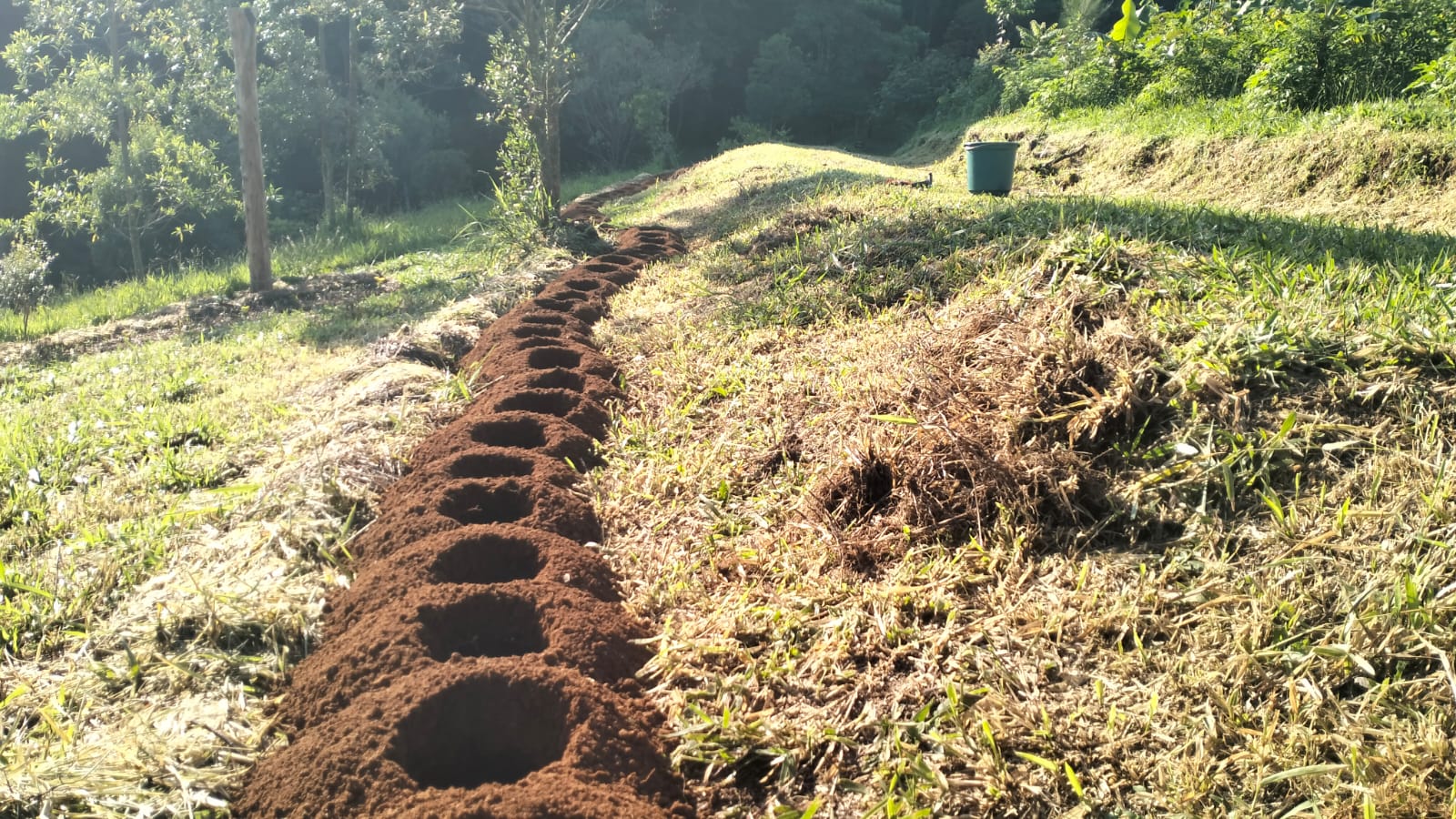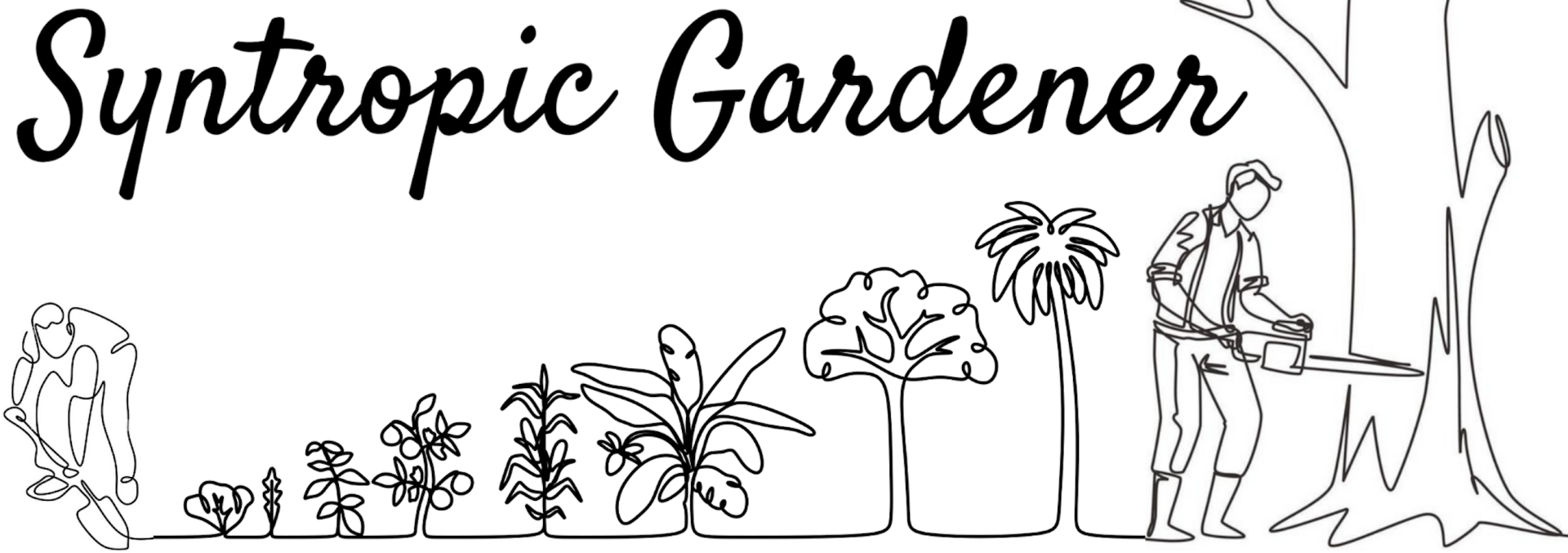Syntropic Agroforestry Traineeship
The traineeship is a integrative, multi-framework, full-time, in-person training program, that teaches you to become a proficient
land and agroforestry Steward/Manager.
There is nothing like it in the world!!!
The Traineeship goes well beyond syntropic agroforestry, it expands into all facets of landscape design, water cycle restoration, biodynamics, holistic decision making, soil science, animal management, arboriculture, irrigation science, market gardening, plant propagation and financial planning.
It's a culmination of 20+ years of my research and practice in regenerative, homestead and subsistence agriculture.
You and I will work closely and you will develop the skills, the experience and the mental capacity to create and holistically manage agroforestry systems across landscapes and climates.
There is nothing like it in the world!!!
The Traineeship goes well beyond syntropic agroforestry, it expands into all facets of landscape design, water cycle restoration, biodynamics, holistic decision making, soil science, animal management, arboriculture, irrigation science, market gardening, plant propagation and financial planning.
It's a culmination of 20+ years of my research and practice in regenerative, homestead and subsistence agriculture.
You and I will work closely and you will develop the skills, the experience and the mental capacity to create and holistically manage agroforestry systems across landscapes and climates.
Here is what you will be trained on...
Here is what you will be trained on...
Learn the Skills That Matter Most
In-Depth Fruit Tree Pruning
Consistent and good quality harvests are dependant on appropriate pruning. To begin, we form the tree to ensure a good shape and height to work with. Then, we regularly prune for vigour and quality of produce.
As part of the Syntropic Agroforestry Traineeship Program, we will spend 3 days (fully catered - Brazilian country-side style food) at SItio Araucarias, who specialises in agro-ecological production of temperate and subtropical fruits, including fig, peach, nectarine, pear, plum, raspberry, blackberry, grapes, orange, lemon, mandarin, blueberry...
It will be a magical experience where you will learn the generalities as well as the specificities of pruning all of these delicious fruits, from formation and resetting pruning, to thinning and shaping trees.
Learn the Skills That Matter Most
In-Depth Fruit Tree Pruning
Consistent and good quality harvests are dependant on appropriate pruning. To begin, we form the tree to ensure a good shape and height to work with. Then, we regularly prune for vigour and quality of produce.
As part of the Syntropic Agroforestry Traineeship Program, we will spend 4 days (fully catered - Brazilian country-side style food) at SItio Araucarias, who specialises in agro-ecological production of temperate and subtropical fruits, including fig, peach, nectarine, pear, plum, raspberry, blackberry, grapes, orange, lemon, mandarin, blueberry...
It will be a magical experience where you will learn the generalities as well as the specificities of pruning all of these delicious fruits, from formation and resetting pruning, to thinning and shaping trees.
If proficiency is what you seek,
then proficiency is what you will get.

Choose the Pathway That Best Fit Your Learning Needs and Lifestyle
The Complete 6-Week Traineeship Program
Build Your Own Training Program

Choose the Pathway That Best Fit Your Learning Needs and Lifestyle
The Complete 6-Week Traineeship Program
Build Your Own Training Program
The Traineeship Structure
Every day on the land will be intentionally and collectively crafted to ensure that you develop a capacity to think, act and feel syntropically. Its not a matter of following a recipe or method, its about being able to create something new, something that is 100% context-specific.
The program blends practice, research and personal discipline into a single lived experience, creating the conditions for real growth and understanding.
There are 3 aspects to the Syntropic Agroforestry Traineeship, these are:
- Practical (hands-on) training;
- Theoretical (mind-on) training; and
- Self-development (will-on) training.
The Traineeship Structure
Every day on the land will be intentionally and collectively crafted to ensure that you develop a capacity to think, act and feel syntropically. Its not a matter of following a recipe or method, its about being able to create something new, something that is 100% context-specific.
The program blends practice, research and personal discipline into a single lived experience, creating the conditions for real growth and understanding.
There are 3 aspects to the Syntropic Agroforestry Traineeship, these are:
- Practical (hands-on) training;
- Theoretical (mind-on) training; and
- Self-development (will-on) training.
Everyday you will think, feel and act syntropically.
Its about becoming one with the ecological processes that surrounds us.
The 3 Pillars of Learning
Practical (Hands-On) Training
Every morning you will engage meaningfully with the natural world under my attentive and supportive guidance.
It all begins with observing and learning to read the landscape, which will inform our daily practices - our conscious actions to increase life.
Through in-depth and regular engagement with all facets of a productive syntropic farm, you will learn to create and manage productive and regenerative systems.
Here, mistakes become lessons, concepts become reality and confidence builds through conscious decision-making.
Practical (Hands-On) Training
Every morning you will engage meaningfully with the natural world under my attentive and supportive guidance.
It all begins with observing and learning to read the landscape, which will inform our daily practices - our conscious actions to increase life.
Through in-depth and regular engagement with all facets of a productive syntropic farm, you will learn to create and manage productive and regenerative systems.
Here, mistakes become lessons, concepts become reality and confidence builds through conscious decision-making.
Practical Activities
Each year, season, month, week and day is a different one, and the practical activities we will be doing will be decided based on reality rather than theory. We will be consistently and consciously active through:
-
Pruning fruit trees (formation, balancing and fruit production)
-
Observing and reading the landscape
-
Planting and managing the market garden
-
Propagating plants through seedlings, grafting, air layering and soft/ hardwood cuttings.
-
Analysing the soil and amending it organically
-
Sowing, maintaining and terminating cover crops and green manures
-
Managing the agroforestry organism
-
Building up and structuring the silvopasture system
-
Irrigating and fertigating vegetables, food forest and pastures
-
Managing chickens regeneratively
-
Using and maintaining hand tools, micro-tractor and wood chipper
-
Designing and implementing new agroforest rows
-
Organising and supporting the water cycle
-
Composting and brewing bio-fertilizers
-
Visiting other agroforest and regenerative agriculture projects
Optional Activities and Focus Areas
Within the traineeship structure, there is always room for individualisation and customisation, the aim is to make it relevant to you and your needs. Make it yours and choose one or more focus areas.
-
Ferro-cement water storage
-
Greenhouse design and management
-
Arboriculture: tree pruning, removal and processing
-
Electric fencing design and installation
-
Spring tapping and water cycle restoration
-
Holistic Grazing
-
Shitake log-cultivation
-
Agroforestry economics
-
Medicinal agroforestry
-
Bush regeneration and ecological restoration
-
Irrigation design, installation and maintenance
-
Natural beekeeping
-
Biodynamic agriculture
-
Astronomic farming and planting calendars
-
Humanure and composting toilets
-
Natural Swimming Pool
Practical Activities
Each year, season, month, week and day is a different one, and the practical activities we will be doing will be decided based on reality rather than theory. We will be consistently and consciously active through:
-
Pruning fruit trees (formation, balancing and fruit production)
-
Observing and reading the landscape
-
Planting and managing the market garden
-
Propagating plants through seedlings, grafting, air layering and soft/ hardwood cuttings.
-
Analysing the soil and amending it organically
-
Sowing, maintaining and terminating cover crops and green manures
-
Managing the agroforestry organism
-
Building up and structuring the silvopasture system
-
Irrigating and fertigating vegetables, food forest and pastures
-
Managing chickens regeneratively
-
Using and maintaining hand tools, micro-tractor and wood chipper
-
Designing and implementing new agroforest rows
-
Organising and supporting the water cycle
-
Composting and brewing bio-fertilizers
-
Visiting other agroforest and regenerative agriculture projects
Optional Activities and
Focus Areas
Within the traineeship structure, there is always room for individualisation and customisation, the aim is to make it relevant to you and your needs. Make it yours and choose one or more focus areas.
Theoretical (Mind-on) Training
In the afternoons we have the opportunity to unlock specific and critical areas of understandings, those that are relevant to your land, lifestyle and climate. The aim here is to deepen your understanding of your context, so when you get back home you know what, when, why and how to do it.
Remember, the traineeship is about you and where you want to go!!
There are two key components of the theoretical part of the traineeship, these are:
- Context-Specific classes, discussions and practices; and
- The Syntropic Agroforest Apprentice course (included in the complete program)
Theoretical (Mind-on) Training
In the afternoons we have the opportunity to unlock specific and critical areas of understandings, those that are relevant to your land, lifestyle and climate. The aim here is to deepen your understanding of your context, so when you get back home you know what, when, why and how to do it.
Remember, the traineeship is about you and where you want to go!!
There are two key components of the theoretical part of the traineeship, these are:
- Context-Specific classes, discussions and practices; and
- The Syntropic Agroforest Apprentice course (included in the complete program)
Mind-on Training Areas
-
Context analysis and value-based decision making
-
Permaculture ethics, principles and practices
-
Biodynamic agriculture
-
Soil science, analysis, correction, and organic amendments
-
Water cycle restoration & flowforms
-
Astronomical farming theory and practice
-
Key line and scale of permanence land design
-
Voisin rational grazing
-
Irrigation science, design and fertigation
-
Plant propagation techniques & applications
-
Market gardening processes & planning
-
Arboriculture science & practices
-
Holistic financial planning
-
Agroforestry Mushroom production
-
Holistic planned grazing
-
Economic viability of agroforestry systems
-
Electrical fencing design and instalation
Mind-on Training Areas
-
Context analysis and value-based decision making
-
Permaculture ethics, principles and practices
-
Electrical fencing design and instalation
-
Biodynamic agriculture
-
Holistic planned grazing
-
Soil science, analysis, correction, and organic amendments
-
Water cycle restoration & flowforms
-
Agroforestry Mushroom production
-
Economic viability of agroforestry systems
-
Astronomical farming theory and practice
-
Key line and scale of permanence land design
-
Holistic financial planning
-
Irrigation science, design and fertigation
-
Arboriculture science & practices
-
Market gardening processes & planning
-
Plant propagation techniques & applications
-
Voisin rational grazing
Every week you will build capacities to become an efficient and effective land steward - consciously and naturally.
The Syntropic Agroforestry Apprentice Course
Self-Development (Will-on) Training
Your success is in your will and desire to succeed.
Self-Development (Will-on) Training
Your success is in your will and desire to succeed.
in the end, it is up to you...
You are the boss of this precious time, no judgements, but use it wisely!
Potential activities are:
-
Choose and read a book or two from our ever expanding library
-
Embark in a artistic adventure with clay, timber, chalk or paint
-
Deepen your understanding of your context, landscape and climate
-
Study the Syntropic Agroforestry Apprentice Course
-
Harvest and cook amazingly nourishing meals
-
Be creative and let your inner will move you

in the end, it is up to you...

You are the boss of this precious time, no judgements, but use it wisely!
Potential activities are:
-
Choose and read a book or two from our ever expanding library
-
Embark in a artistic adventure with clay, timber, chalk or paint
-
Deepen your understanding of your context, landscape and climate
-
Study the Syntropic Agroforestry Apprentice Course
-
Harvest and cook amazingly nourishing meals
-
Be creative and let your inner will move you
Are you ready to be who you want to be?
Day/Week Schedule of Activities
In our quest to work together with the natural world, we also need to be rhythmical.
Below you can find the general rhythm of the traineeship, obviously it can be played with, without losing its essence!
Day/Week Schedule of Activities
In our quest to work together with the natural world, we also need to be rhythmical.
Below you can find the general rhythm of the traineeship, obviously it can be played with, without losing its essence!
A multi-framework approach to Land & Agroforestry Management
Logistics and Housekeepings
Living, sleeping, Eating, drinking and surfing the web
Livingness Centre for Holistic Land Management
Arrival and Departure

Traineeship Enrolment
Dates & Pricing
6-Week Syntropic Agroforestrt Traineeship
A complete, guided pathway covering all core pillars of syntropic agroforestry and integrative land management.
The best pathway to proficiency!
Custom Training
Choose your focus area(s) and build a personalised learning journey that fits your needs, goals, and lifestyle.
Take your life to the next level!
Dates & Pricing
6-Week Syntropic Agroforestrt Traineeship
A complete, guided pathway covering all core pillars of syntropic agroforestry and integrative land management.
The best pathway to proficiency!
Custom Training
Choose your focus area(s) and build a personalised learning journey that fits your needs, goals, and lifestyle.
Take your life to the next level!



